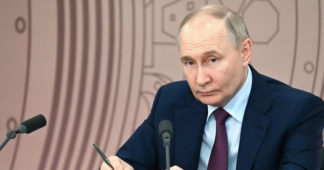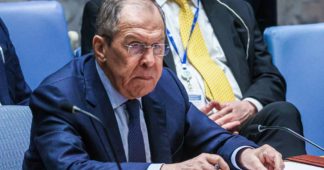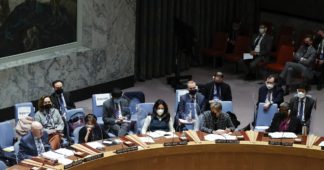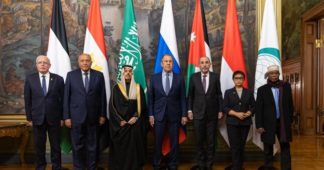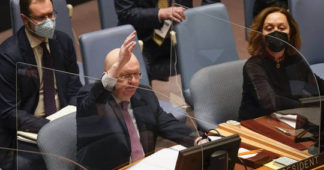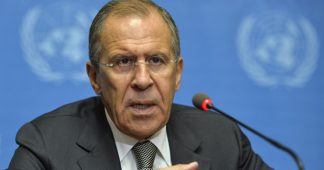Jul 17, 2024
Condemning U.S. exceptionalism, Russian Foreign Minister Sergei Lavrov laid out to the Security Council how the world can overcome U.S.-led aggression to find peaceful co-existence in a multilateral world.
“Let’s face it: not all countries represented in this chamber recognise the key principle of the U.N. Charter which is the sovereign equality of all states,” Russian Foreign Minister Sergei Lavrov told U.N. Security Council on Tuesday. “Speaking through its presidents, the United States has long declared its exceptionalism. This applies to Washington’s attitude towards its allies, whom it demands to be unquestioningly obedient even to the detriment of their national interests. Rule, America! This is the thrust of the notorious ‘rules-based order’ which presents a direct threat to multilateralism and international peace.” Dozens of nations’ representatives spoke after Lavrov in a debate on multilateralism called by Russia, the council’s president for July.
FULL TEXT OF SPEECH BY RUSSIAN FOREIGN MINISTER SERGEI LAVROV TO THE U.N. SECURITY COUNCIL
I would like to extend a warm welcome to distinguished dignitaries present in the Security Council Chamber. Their participation in today’s meeting confirms the importance of the subject under review. In accordance with Rule 37 of the Council’s provisional rules of procedure, I invite the representatives of Australia, Bangladesh, Belarus, the Plurinational State of Bolivia, Brazil, Cambodia, Chile, Cuba, the Dominican Republic, Egypt, Ethiopia, Ghana, Guatemala, Hungary, India, Indonesia, Islamic Republic of Iran, Iraq, Kazakhstan, Kuwait, Maldives, Morocco, Nepal, Nicaragua, Pakistan, the Philippines, Saudi Arabia, Serbia, South Africa, Syrian Arab Republic, Thailand, Timor-Leste, Türkiye, the UAE, Uganda, Vietnam, and the Bolivarian Republic of Venezuela to take part in the session.
In accordance with Rule 39 of the Council’s provisional rules of procedure, I invite His Excellency Stavros Lambrinidis, Head of the European Union Delegation to the United Nations, to participate in this meeting.
The Security Council will now begin its consideration of agenda item 2. I would like to draw the attention of the Council members to document S/2024/537, a cover letter dated July 9, 2024 from the Permanent Representative of the Russian Federation to the United Nations addressed to Secretary-General of the United Nations Antonio Guterres for a policy brief on the item under review.
Distinguished Ladies and Gentlemen,
Your Excellency,
Today, the very foundations of the international legal order – strategic stability and the U.N.-centric system of international politics – are put to the test. We won’t be able to resolve the mounting conflicts unless we understand their root causes and restore faith in our ability to join forces for the common good and justice for all.
Let’s face it: not all countries represented in this chamber recognise the key principle of the U.N. Charter which is the sovereign equality of all states. Speaking through its presidents, the United States has long declared its exceptionalism. This applies to Washington’s attitude towards its allies, whom it demands to be unquestioningly obedient even to the detriment of their national interests.
Rule, America! This is the thrust of the notorious “rules-based order” which presents a direct threat to multilateralism and international peace.
The most important components of international law – the U.N. Charter and the resolutions of our Council – are interpreted by the collective West in a perverse and selective manner, depending on the instructions coming from the White House. Numerous Security Council resolutions have been ignored altogether, among them Resolution 2202, which approved the Minsk agreements on Ukraine, and Resolution 1031, which approved the Dayton Agreement on peace in BiH on the basis of the principle of equal rights of the three constituent peoples and two entities.
We can discuss endlessly the sabotage of the resolutions on the Middle East. Just think back to what Antony Blinken had to say in an interview with CNN in February 2021 taking a question about what he thinks about the decision of the previous US administration to recognise the Syrian Golan Heights as part of Israel. In case someone is not sure what his answer was, I will refresh your memory. The Secretary of State said, “Leaving aside the legalities of that question, as a practical matter, the Golan is very important to Israel’s security.”
This is despite the fact that U.N. Security Council Resolution 497 of 1981, which you and I are well aware of and which no one has cancelled, qualifies annexation of the Golan Heights by Israel as illegal. However, according to those very “rules,” to quote Mr Blinken, “legal questions are something else.” And, of course, everyone remembers the statement by the US Ambassador to the U.N. that Resolution 2728 adopted on March 25 demanding an immediate ceasefire in the Gaza Strip “is not legally binding,” meaning that the American “rules” supersede Article 25 of the U.N. Charter.
Last century, George Orwell predicted the essence of the rules-based order in the novel Animal Farm: “All animals are equal, but some animals are more equal than others.” It means that you are allowed to do what you wish if you follow orders from the ruling leader. But if you dare to protect your national interests, you will be declared an outlaw and beleaguered by sanctions.
Washington’s hegemonistic policy has been the same for decades. Absolutely all schemes of Euro-Atlantic security were based on America’s domination, including the subjugation of Europe and the “containment” of Russia. The main role in this was assigned to NATO, which has ultimately tramped down the European Union that had been created to serve Europeans. The alliance has unceremoniously privatised OSCE bodies in brazen violation of the Helsinki Final Act.
The unrestrained enlargement of NATO, which went on for years contrary to Moscow’s warnings, has also provoked the Ukraine crisis that began with the state coup organised by Washington in February 2014 to seize full control of Ukraine and use the neo-Nazi regime they brought to power to prepare an attack on Russia. When Petr Poroshenko, and after him Vladimir Zelensky, waged a war against their own citizens in Donbass, outlawed Russian education, Russian culture, Russian media and the Russian language and banned the Ukrainian Orthodox Church, nobody in the West noticed that, and nobody demanded that their wardens in Kiev “observe the proprieties” and respect international conventions on the rights of national minorities or the Constitution of Ukraine, which stipulates respect for these rights.
It is to eliminate these threats to the national security of Russia, to protect the people who consider themselves part of Russian culture and live on the land that their ancestors developed for centuries, as well as to save them from legal and physical extermination that the special military operation began.
It is notable that today, when numerous initiatives are advanced for a settlement in Ukraine, few remember that Kiev trampled on the human rights and the rights of national minorities. It was only recently that a relevant request had been added to the EU documents on the start of negotiations, and then mostly thanks to Hungary’s firm position of principle. However, Brussels’s ability and willingness to influence the Kiev regime are open to speculation.
We urge everyone who is sincerely interested in overcoming the crisis in Ukraine to formulate their proposals with due regard for the fundamental issue of ensuring the rights of all, without exception, ethnic minorities. Its suppression will debase any peace initiatives, while giving de facto approval to Vladimir Zelensky’s racist policy. It is notable that ten years ago, in 2014, Zelensky said, quote: “If people in eastern Ukraine and Crimea want to speak Russian, leave them alone and let them speak Russian on legal grounds. Language will never divide our country.” But Washington has disciplined him, and in 2021 Zelensky said in an interview that those who regard themselves as part of Russian culture should pack up and go to Russia for the sake of their children and grandchildren.
I call on the masters of the Ukrainian regime to make it respect Article 1.3 of the U.N. Charter, which declares respect for human rights and fundamental freedoms for all “without distinction as to race, sex, language, or religion.”
Colleagues,
The North Atlantic Alliance is no longer satisfied with the war it has unleashed against Russia by the hands of the illegitimate government in Kiev, nor is it satisfied with the entire OSCE space. Having destroyed almost to the ground the fundamental agreements on arms control, the United States continues to escalate the confrontation.
At a recently held summit in Washington, D.C., the leaders of the NATO countries reaffirmed their claims to the leading role not only in the Euro-Atlantic but also in the Asia-Pacific region. They declared that NATO is still guided by the objective of defending the territory of its members, but for this purpose they allegedly need to extend the alliance’s dominance to the entire Eurasian continent and adjacent sea areas.
NATO’s military infrastructure is moving into the Pacific with the obvious aim of undermining the ASEAN-centric architecture, which has for many decades been built on the principles of equality, mutual interests and consensus. To replace the inclusive mechanisms created around ASEAN, the United States and its allies are cobbling up closed confrontational blocs such as AUKUS and other groups of four or three countries that are subordinate to them. The other day Deputy Secretary of Defence Kathleen Hicks said the United States and its allies must be “prepared for the possibility of protracted war…and not just in Europe, either.”
For the sake of “containing” Russia, China and other countries whose independent policies are perceived as a challenge to hegemony, the West, through its aggressive actions, is breaking the system of globalisation, which was originally formed according to its own moulds. Washington has done everything to blow up (including literally by organising terrorist attacks on the Nord Stream pipelines) the foundations of mutually beneficial energy cooperation between Russia and Germany and Europe as a whole. Berlin was silent at the time.
Today, we see yet another humiliation of Germany, whose government unquestioningly obeyed the US decision to deploy US ground-based medium-range missiles on German territory. German Chancellor Olaf Scholz said simple-heartedly that the United States has decided to deploy precision strike systems in Germany, and “it is a necessary and important decision at the right time.” The United States has decided so.
On top of it, White House National Security Communications Adviser John Kirby stated on behalf of the US President that they were not seeking a third world war, since it would have terrible consequences for Europe. A Freudian slip, as they say. Washington is convinced that it is not the US that will suffer from a new global war, but its European allies. If the Biden administration’s strategy is based on such an analysis, it is an extremely dangerous misconception. Europeans, of course, must realise the suicidal role they are destined to play.
The Americans, having called the entire collective West to arms, are expanding the trade and economic war with the unwanted actors, having unleashed an unprecedented campaign of unilateral coercive measures that are backfiring, primarily, on Europe and further fragment the global economy. The countries of the Global South in Asia, Africa and Latin America are suffering from the neo-colonial practices of Western countries. Illegal sanctions, numerous protectionist measures, restrictions on access to technology directly contradict genuine multilateralism and create serious obstacles to achieving the goals of the U.N. development agenda.
Where are the free market attributes that the United States and its allies have been telling everyone to follow for so many years? Market economy, fair competition, inviolability of private property, presumption of innocence, freedom of movement of people, goods, capital and services – all of these have been scrapped. Geopolitics has buried the laws of the market that the West once touted as sacred. Recently, we have heard public demands from the US and EU officials for China to reduce overproduction in high-tech industries, as the West has begun to lose its long-standing advantages in these sectors as well. Now, the very same “rules” have superseded market principles.
Colleagues,
The actions of the United States and its allies are hindering international cooperation and the creation of a more just world. They have taken countries and regions hostage, prevent nations from realising their sovereign rights declared in the U.N. Charter, and interfere with their vital joint efforts to settle conflicts in the Middle East, Africa and other regions, to reduce global inequality and combat the threats of terrorism and drug crime, hunger and diseases.
I am confident that this situation can be changed if there is good will, of course. To stop the implementation of a negative scenario, we would like to propose to discuss a number of steps towards restoring trust and stabilising the international situation.
1. The root causes of the ongoing crisis in Europe should be eliminated once and for all. The conditions for restoring stable peace in Ukraine have been put forth by President of Russia Vladimir Putin. There is no need to repeat them.
A political and diplomatic settlement should be complemented with practical steps, to be taken in the West and the Euro-Atlantic community, to remove threats to the Russian Federation. The coordination of mutual guarantees and agreements should be based on the recognition of the new geostrategic realities on the Eurasian continent, where a continental architecture of really equal and indivisible security is taking shape. Europe risks lagging behind this objective historical process. We are ready to discuss a balance of interests.
2. The restoration of the regional and global balance of forces should be accompanied with active efforts to eliminate injustices in the global economy. There must be no monopoly in monetary and financial regulation, trade and technologies, by definition. This opinion is shared by the overwhelming majority of international community. It is extremely important to reform the Bretton-Woods institutions and the WTO as soon as possible, for their operations must reflect the real weight of the non-Western growth and development centres.
3. Major fundamental changes are necessary in other institutes of global governance if we want them to work to the benefit of all. This primarily concerns the United Nations Organisation, which remains the embodiment of multilateralism against all the odds, with unique and universal legitimacy and universally recognised broad competencies.
An important step towards the restoration of the U.N.’s effectiveness would be the reconfirmation by all member states of their commitment to the principles of the U.N. Charter, not selectively but in their entirety and as a whole. The form of this reconfirmation can be discussed jointly.
The Group of Friends in Defence of the U.N. Charter, created at the initiative of Venezuela, is doing a great deal towards this. We invite all countries that believe in the priority of international law to join its efforts.
The pivotal element of the reform of the U.N. should be the reshuffle of the U.N. Security Council, although this alone will not promote efficiency without a fundamental agreement of the permanent members on its operating methods. However, this must not hinder the imperative elimination of the geographic and geopolitical imbalances in the Security Council, which clearly has too many representatives of the collective West. A badly needed step is to reach the broadest accord possible on the concrete parameters of the reform, which should increase the representation of Asia, Africa and Latin America.
The personnel policy of the U.N. Secretariat should be changed as well to eliminate the domination of Western citizens and subjects in the administrative U.N. bodies. The U.N. Secretary-General and his staff must faithfully and with no exceptions comply with the principles of impartiality and neutrality, as it is set out in Article 100 of the U.N. Charter, which we keep reminding you about.
4. The strengthening of the foundations of multipolarity should not only be promoted by the U.N. but also by other international organisations, including the Group of Twenty where all countries of the Global Majority and the West are represented. The mandate of G20 is restricted to discussing economic and development issues, and it is important to protect substantive dialogue at this venue from populist attempts to add geopolitical topics to its agenda. This might destroy this useful platform.
BRICS and the Shanghai Cooperation Organisation are playing an increasing role in the development of a just multilateral world based on the principles of the U.N. Charter. Their member states represent different regions and civilisations whose interaction is based on equality, mutual respect, consensus and mutually accepted compromises, which is the golden standard of multilateral cooperation involving great powers.
Regional associations have practical significance for the development of multipolarity, including the CIS, the CSTO, the EAEU, ASEAN, the Gulf Cooperation Council (GCC), the Arab League, the African Union and CELAC. We believe that it is important to develop multifaceted ties between these associations, including by using the U.N. potential. Russia will devote one of the next meetings during its Security Council Presidency to interaction between the U.N. and Eurasian regional organisations.
Colleagues,
On July 9, 2024, President of Russia Vladimir Putin, addressing the BRICS Parliamentary Forum in St Petersburg, noted: “The formation of a world order that reflects the real balance of forces and the new geopolitical, economic and demographic reality is a complicated and, unfortunately, even painful process.” We believe that discussions of this issue should not devolve into fruitless polemics, and that they should hinge on a sober assessment of the totality of facts. First of all, it is necessary to reinstate professional diplomacy, the culture of dialogue, the ability to listen and hear and to retain the channels of crisis communications.
The lives of millions of people depend on the ability of politicians and diplomats to formulate something like a common perception of the future. It depends on member countries alone whether our world will be diverse and equitable. The Charter of our Organisation is our foothold. The United Nations will be able to overcome current disagreements and to reach consensus on most issues if everyone, without exception, honours its letter and spirit. “The end of history” has failed to materialise. Let us work together in the interests of launching the history of genuine multilateralism that reflects the entire wealth of cultural and civilisational diversity of the world’s nations. We are inviting everyone to join the discussion, which should certainly be completely honest.
Also read mid.ru/en/press_service
We remind our readers that publication of articles on our site does not mean that we agree with what is written. Our policy is to publish anything which we consider of interest, so as to assist our readers in forming their opinions. Sometimes we even publish articles with which we totally disagree, since we believe it is important for our readers to be informed on as wide a spectrum of views as possible.
